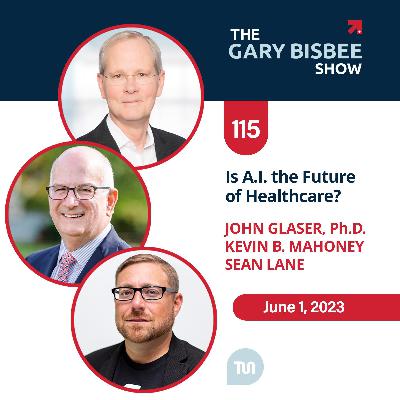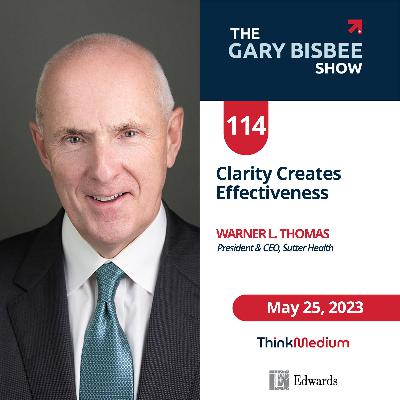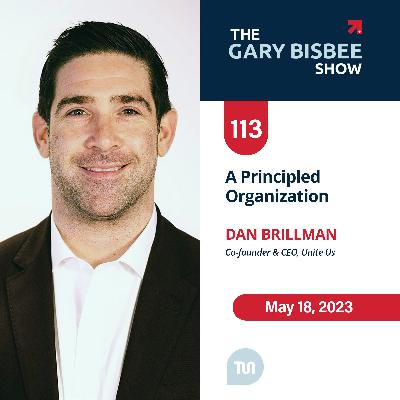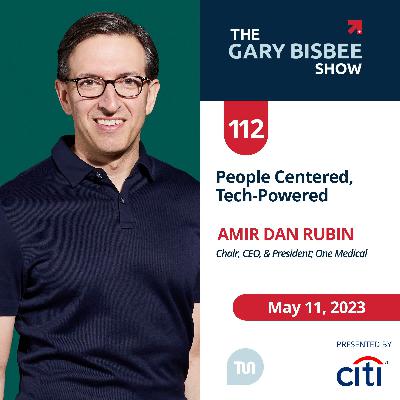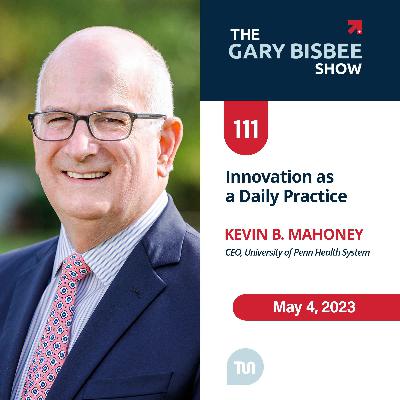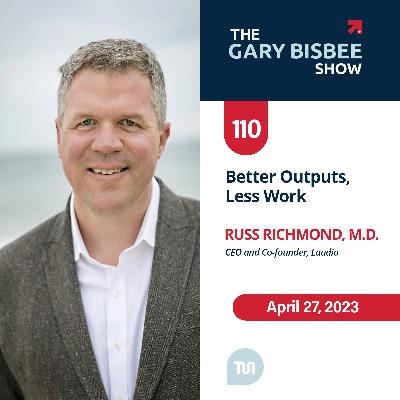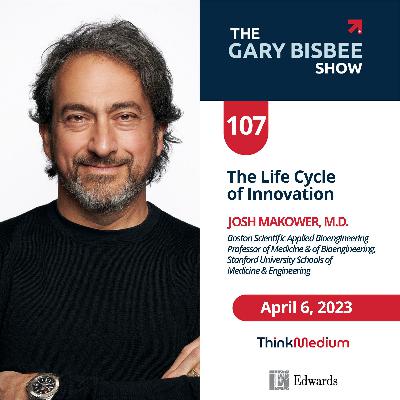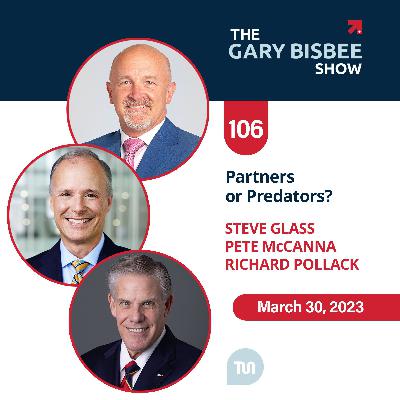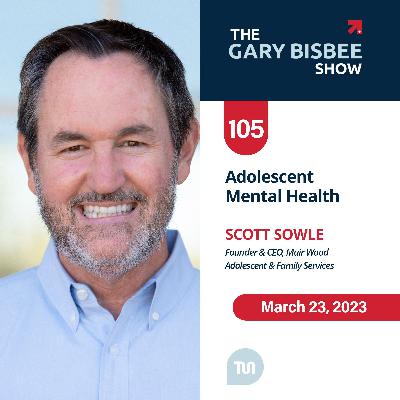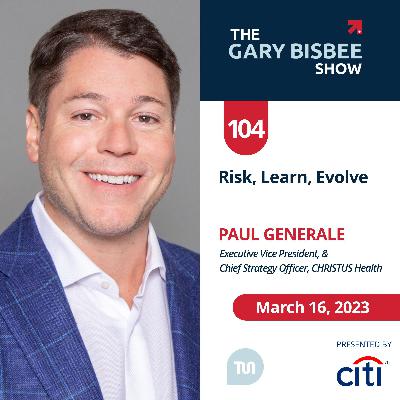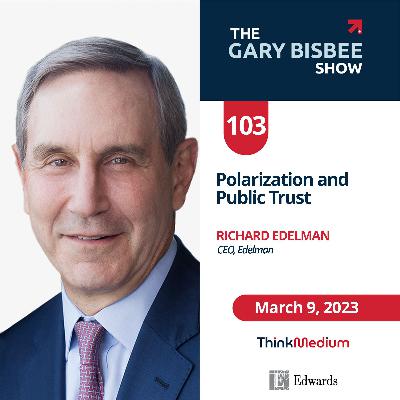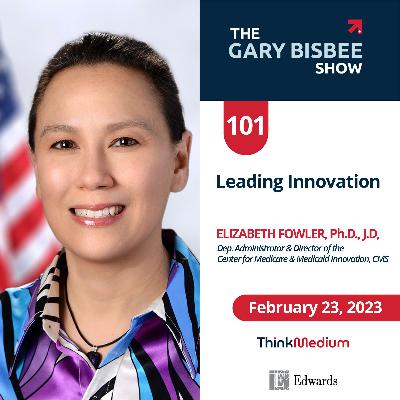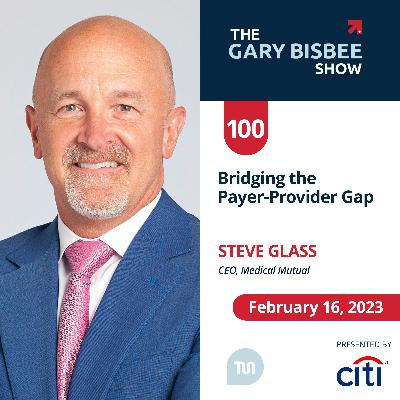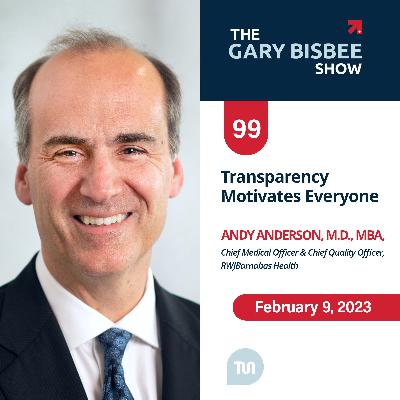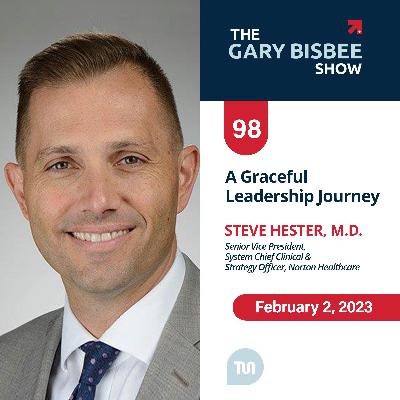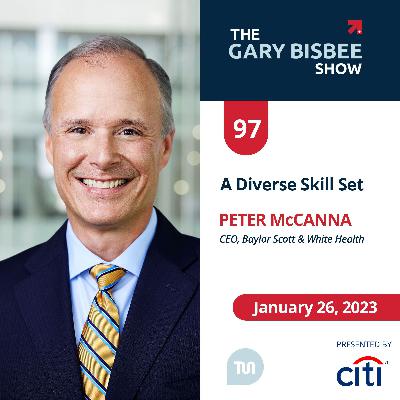Discover The Gary Bisbee Show
The Gary Bisbee Show

The Gary Bisbee Show
Author: Think Medium
Subscribed: 2Played: 189Subscribe
Share
© Think Medium
Description
The Gary Bisbee Show is a weekly podcast discussing how leading health system CEOs and healthcare leaders are navigating the evolving healthcare landscape while leading high-performing teams and driving innovation across the industry.
118 Episodes
Reverse
Meet Elazer EdelmanElazer R. Edelman, M.D., Ph.D., is the Edward J. Poitras Professor in Medical Engineering and Science at MIT, Professor of Medicine at Harvard Medical School, and Senior Attending Physician in the coronary care unit at the Brigham and Women’s Hospital in Boston. Key Insights:Dr. Edelman works at the intersection of the physical sciences and medicine to improve healthcare. Key Intersections. Dr. Edelman believes that clinical work, scientific research, and engineering must all come together to keep the medical profession on track.Explaining and Receiving Feedback. Physician-scientists have an obligation to explain their methods and then to listen carefully to feedback to ensure widespread understanding.How to spur Innovation? Create communities where people feel safe and secure saying that they don’t know—and then let them investigate. This episode was made possible by our partnership with Edwards Lifesciences. Relevant Links:Read more about Dr. EdelmanLearn about the Brigham and Women’s Hospital
Meet the Guests:This episode features three leaders previously interviewed on The Gary Bisbee Show. John Glaser, Ph.D., is an Executive in Resident at Harvard Medical School and recently published “Advanced Introduction to Artificial Intelligence in Healthcare.” Kevin B. Mahoney is chief executive officer of the University of Pennsylvania Health System, a pillar of the Penn Medicine enterprise. Sean Lane is the CEO of Olive and CEO of Circulo Health. Previously, he was an Intelligence Officer for the National Security Agency. Key Insights:Many of healthcare’s key leaders are making a deliberate effort to understand the uses of A.I.• No Gimmick. In the race to produce technology that “wows,” the market may be flood with flashy products that don’t produce better results. Leaders need to be discerning about A.I.• Who Buys A.I.? According to John Glaser, nobody buys A.I. – instead, people buy products that have been made more reliable and effective by their incorporation of the new technology. • What is A.I. for? Ultimately, A.I. is useful to the extent that it frees up human capacity, so that healthcare can be more human than it ever has been. Relevant Links:Listen to John Glaser’s full episodeListen to Kevin B. Mahoney’s full episodeListen to Sean Lane’s full episode
Meet Warner ThomasWarner L. Thomas is president and CEO of Sutter Health, a Northern California based not-for-profit integrated health system that cares for more than 3 million patients in one of the most diverse and innovative regions of the country. A grounded-yet-visionary leader, Thomas has demonstrated the capability to navigate the dynamic healthcare landscape at every level — from outstanding patient care to organizational strategy to public policy at both the state and national levels. Key Insights:Warner Thomas believes that communication and transparency are key to an organization’s success. Can we prepare for everything? Warner Thomas worked in a leadership position during Hurricane Katrina and concluded: “there will always be things you don’t anticipate.” New Leadership. When starting a new leadership position, make an effort to communicate with every level. Talk to nurses, to clinicians, to support staff. Training is key. Mr. Thomas believes the workforce challenge facing healthcare can only be solved by creating a dependable talent pipeline. This episode was made possible by our partnership with Edwards Lifesciences. Relevant Links:Read more about Sutter HealthRead about Warner Thomas
Meet Dan BrillmanDan Brillman is the Co-founder and CEO of Unite Us. Dan graduated from Yale University in 2006 and worked in finance and consulting before joining the Air Force Reserves as a combat pilot, where he still serves today. Dan Co-founded Unite Us in 2013. Key Insights:Dan Brillman Co-founded Unite Us in 2013, and has a decade of success to show for it. Create the Standard. In a chaotic field, innovators have to be the agents who bring order.How to Overcome Fragmentation? Unite Us put years of work into understanding various sectors and systems in order to make access close to effortless for individuals. Blurring Boundaries. Dan says our understanding of “Health” is blurring, as we come to better understand social determinants – and this is progress. Relevant Links:Read more about Dan BrillmanRead about Unite Us
Meet Amir Dan RubinAmir Dan Rubin has focused his career on transforming health care. Through One Medical’s human-centered and technology-powered model, he serves on a team dedicated to delighting members with better health and better care, while reducing total costs. Previously, as an EVP and divisional CEO at UnitedHealth Group’s Optum division, he oversaw a number of areas focused on helping to make the health system work better. Amir also previously served as president and CEO of Stanford Health Care in Palo Alto. Key Insights:Amir Dan Rubin is leading the way as Amazon’s One Medical forges new paths in the healthcare economy. Customer First. One Medical brings Amazon’s strategy of “working backwards” to the medical economy. Integrated Support. Amir suggests that it’s crucial to make the patient feel supported, but it’s equally important to make clinicians and team members feel that they are supported.Is there Market Opportunity? There’s “total unmet need” – from questions of access to managing chronic disease, there are many places to improve healthcare. Relevant Links:Read more about Amir Dan RubinRead more about One Medical
Meet Kevin B. MahoneyKevin B. Mahoney is chief executive officer of the University of Pennsylvania Health System, a pillar of the Penn Medicine enterprise. He leads health system operations, spanning six hospitals, 11 multispecialty centers and hundreds of outpatient facilities in Philadelphia, Delaware and New Jersey. Key Insights:Kevin Mahoney’s decades of leadership in healthcare have taught him the importance of innovating. Fearless Convictions. If you stand by your principles, as you continue to listen to others, people will naturally pull towards you. How to Keep Innovating? Be clear about how things are working in the present, but always be reassessing and asking, “Could we do it better? Is there another way?”Collegial Competition. The presence of just one innovative thinker can be contagious, and often encourages others to attempt innovation themselves. Relevant Links:Read more about Kevin B. MahoneyFollow Kevin on Twitter
Meet Russ RichmondRuss Richmond is a physician entrepreneur with experience building digital health companies such as Laudio, Advanced Practice Strategies (APS), Objective Health, Verisk Health, and D2Hawkeye, as well as counseling large payors and health systems while with McKinsey & Company. Key Insights:Dr. Richmond’s company, Laudio, brings all of the major hospital workloads together for frontline health system managers. Solving Labor. Dr. Richmond understood, early on, that labor and labor productivity would be the major issue for health systems.A Workflow Interface? Laudio brings 7 or 8 major workloads together, and also suggests the next best actions, to help guide managers.Start Early. Dr. Richmond suggests that if you have an idea for an entrepreneurial venture, it’s best to start as soon as possible. Relevant Links:Read more about Russ RichmondLearn more about Laudio
Meet Sina Chehrazi:Sina Chehrazi is an entrepreneur and business executive with experience across the various stages of the entrepreneurial process. Sina serves as the Founder and Chief Executive Officer of Nayya, a platform that uses AI and data science to personalize the way people choose and use their benefits.Key Insights:Sina Chehrazi advocates for a leadership that is genuine with the team and with customers.● How to Improve Healthcare? Sina explains that if you want to change healthcare, you have to start by following how the money flows. ● Confidence. Customers who know what they’re investing in are more likely to jump in with an innovator.● Integration. Nayya aims to be the hub that connects and personalizes a consumer’s health life. Read more about NayyaFollow Sina on Twitter
Meet Richard WintersDr. Richard Winters is a practicing emergency physician and executive coach at Mayo Clinic. As director of Leadership Development for the Mayo Clinic Care Network, Dr. Winters facilitates retreats and delivers programs that train leaders at healthcare organizations worldwide. Key Insights:Dr. Winters practices Emergency Medicine and coaches leadership in the medical industry. Uncertainty. Dr. Winters says healthcare is volatile, uncertain, complex, and ambiguous – and leaders must become adept at thriving in such situations. Why Physician Autonomy? As organizations scale, agility is required. Trusting employees to make the right call based on their own judgment improves overall quality.Nuance and Compromise. Unlike in the ER, the board room requires constant negotiation and compromise. Making change is a process and requires careful language. Relevant Links:Read more about Dr. WintersOrder a copy of “You’re the Leader”
Meet Josh MakowerJosh Makower, M.D., is the Boston Scientific Applied Bioengineering Professor of Medicine and of Bioengineering at the Stanford University Schools of Medicine and Engineering, and is the Director and Co-Founder of the Stanford Byers Center for Biodesign, and Founder of Stanford’s Biodesign Policy Program. Key Insights:Josh holds over 300 patents, and believes that innovation is a process than can be taught. How to improve global health? Josh believes that innovation can be learned deliberately, and that those who practice it according to his process, will get good at it. Two Modes. The innovator must first consider all possibilities, even “wild ideas,” and then switch gears, to identify dead ends as rapidly as possible. Teaching Policymakers. In addition to teaching aspiring innovators, Josh believes that educating the next generation of policymakers is a crucial undertaking. This episode was made possible by our partnership with Edwards Lifesciences. Relevant Links:Read more about Josh MakowerRead more about Stanford’s Biodesign Policy Program
Meet the Guests:This episode features three leaders previously interviewed on The Gary Bisbee Show. Listeners will hear from: Pete McCanna, CEO, Baylor Scott & White Health; Steve Glass, President and CEO, Medical Mutual, and Richard Pollack, President and CEO, American Hospital Association. Key Insights:Our guests offer commentary on how new, for-profit entrants are changing the health economy.What Do Consumers Demand? Legacy systems must evaluate the prospect of building partnerships with the new large-cap entrants to provide customers with what they demand.Capital and Profit. New entrants are finding market inefficiencies, which brings innovation. The danger is disintermediation and fracturing of the care continuum. Predatory Practice. Mr. Pollack sees promise in the potential for partnering, but he warns that for-profit models neglect poor and under-insured populations. Relevant Links:View Pete McCanna’s full episodeView Steve Glass’s full episodeView Richard Pollack’s full episode
Meet Scott SowleScott Sowle launched Muir Wood Adolescent and Family Services in 2013. Muir Wood is the culmination of his personal and professional experiences and has become recognized nationally as a gold standard in adolescent behavioral health care. Key Insights:Scott Sowle is an expert in creating treatment programs that emphasize kindness and compassion.Urgent Work. Professionals are tracking higher use of cannabis, alcoholism and stimulants—and are especially concerned with fentanyl use among teens. Gender-separate Treatment? The Muir Wood facilities separate residents by gender, which allows great trust to emerge, facilitating vulnerable sharing throughout recovery. Twin Keys. The two biggest components of successful treament are length of stay, and parental involvement. Relevant Links: Read more about Muir Wood Adolescent and Family ServicesRead about Scott Sowle
Meet Paul Generale:Paul Generale is a healthcare executive bringing nearly two decades of experience in the fields of finance and administration to his role as a senior executive with CHRISTUS Health. Key Insights:Mr. Generale believes that effective healthcare leaders must be able to adapt and pivot when new strategies are needed. What Recent Trends are Here to Stay? Innovation in digital, the care continuum, and Medicare and other regulator payers moving things to outpatient—these are here to stay.Integrated Health Plan. Instead of being fee-for-service, offering an in-house health plan allows healthcare systems to attack some of the social determinants.Continue Learning. Paul remarks, “Take some risk, learn. Try to evolve. There's not a path. If you find that opportunity, take it.” This episode was made possible by our partnership with Citi. Relevant Links:Learn more about Paul GeneraleRead about CHRISTUS Health
Meet Richard EdelmanRichard Edelman is the CEO of Edelman, a global communications firm, and Chairman of Daniel J. Edelman Holdings, the firm’s holding company. Now in his 26th year as CEO, Richard is one of the longest tenured agency leaders in the marketing services industry. Key Insights:Richard Edelman oversees international polling on personal and institutional trust. Where does Political Dialog Occur? The most believable place to have a quality conversation on politics is at work. It's not in your neighborhood anymore. It's in the workplace, because people now have transferred so much of their psychic energy to work.How to Address Misinformation? There is a continued need to supplement information on social. I think companies have to participate in social put good facts in there. If they have quality information, sharing through newsletters, I just don't think media can do it aloneHow to be Trustworthy? It used to be that 75% of trust score was related to ability. Now that's taken for granted almost the other 75 has to do with who you are. Do you have a mission?This episode was made possible by our partnership with Edwards Lifesciences.Relevant Links:Read more about Richard’s careerRead about Richard’s company, Edelman
Meet Richard PollackRick Pollack is president and CEO of the American Hospital Association (AHA), the nation’s largest hospital and health care system membership organization with nearly 5,000 member hospitals, health care systems, networks, and other providers of care. Serving as the AHA’s top leader since 2015, Rick is widely recognized for his strong, effective advocacy and leadership on behalf of our nation’s hospitals, the patients and communities they serve, and the health care professionals those organizations support. During the height of the COVID-19 pandemic, Rick built a coalition including the American Medical Association, the American Nurses Association, state and regional hospital associations, and other leading health organizations to support efforts in following public health guidelines, promoting vaccination, with a focus on vulnerable communities, and successfully obtaining the financial resources and regulatory flexibility to keep our hospitals open to care for their patients and communities during the most challenging public health crisis of our time. Key Insights:Mr. Pollack is an experienced leader and expert in health policy, health financing, and advocacy. Unifying Issues. In spite of diversity of concerns among members, certain issues draw all together: financial challenges, workforce challenges, cybersecurity, etc. Bipartisan Advocacy. The AHA has been intentional about working across the political divide, developing close relationships with both Trump and Biden administrations. Consolidation Advantage. The shift to value based care involves managing risk, and larger organizations can typically handle more risk: consolidation often makes sense. Relevant Links:Read more about Mr. PollackRead about the American Hospital Association
Meet Elizabeth Fowler:Dr. Elizabeth Fowler is Deputy Administrator and Director of the Center for Medicare and Medicaid Innovation at CMS. Dr. Fowler previously served as Executive Vice President of programs at The Commonwealth Fund and Vice President for Global Health Policy at Johnson & Johnson. Before that, she was special assistant to President Obama on health care and economic policy at the National Economic Council. From 2008 to 2010, she was Chief Health Counsel to Senate Finance Committee Chair, Senator Max Baucus (D-MT), where she played a critical role developing the Senate version of the Affordable Care Act. She also played a key role drafting the 2003 Medicare Prescription Drug, Improvement and Modernization Act (MMA). Dr. Fowler has over 25 years of experience in health policy and health services research. She earned a bachelor’s degree from the University of Pennsylvania, a Ph.D. from the Johns Hopkins Bloomberg School of Public Health, and a law degree (J.D.) from the University of Minnesota. She is admitted to the bar in Maryland, the District of Columbia, and the U.S. Supreme Court. Dr. Fowler is a Fellow of the inaugural class of the Aspen Health Innovators Fellowship and was elected to the National Academy of Medicine in 2022. Key Insights:Dr. Fowler is committed to the goal of reducing healthcare spending on a net basis into the future.Efficiency. Part of the ACA passed in 2010, the CMS Innovation Center aims to reduce barriers to care delivery, making healthcare more affordable and efficient. Long Term Plans. Dr. Fowler suggests that changing our healthcare system for the better is a project of immense scope. Prepare to measure progress on a scale of decades. Realism and Risk. Value-based care remains the goal, but Dr. Fowler understands that many organizations still face challenges that prevent them from adopting value models.This episode was made possible by our partnership with Edwards Lifesciences.Relevant Links:Follow Dr. Fowler on TwitterLearn about the CMS Innovation Center
Meet Steve Glass:Steve Glass is CEO of Medical Mutual and a member of the company’s board of directors. An experienced healthcare executive, Steve joined the Cleveland Clinic in 2002 and was named the organization’s CFO in 2005. In that role, he was responsible for the overall financial operations of the Cleveland Clinic and its subsidiaries worldwide. Mr. Glass earned a Bachelor of Science degree in Accounting from Towson University in Maryland and is a Certified Public Accountant. He is on the board of directors for the Greater Cleveland Partnership, as well as a member of the American Institute of Certified Accountants, Ohio Society of Certified Public Accountants and Healthcare Financial Management Association.Key Insights:Steve Glass believes that providers and payers can work together to minimize friction in healthcare.The CEO Role. Stakeholders inside and outside of the company look to the CEO to be the voice of the organization, and establishing trust is key. Managing Risk. Insurers understand the benefit of moving to value-based care, but it’s important to monitor and manage financial risk as health systems move in that direction.A Capitalist Society. Steve remarks, “If somebody’s coming into your market, it’s because they see an opportunity.” Providers and Payers need to innovate to meet the challenge.This episode was made possible by our partnership with Citi.Relevant Links:Read more about Steve GlassRead about Medical Mutual
Meet Dr. Andy AndersonDr. Andy Anderson is Chief Medical Officer and Chief Quality Officer for RWJBarnabas Health. He oversees the clinical activities of one of the largest academic health systems in the nation. Dr. Anderson guides medical professionals through new models of health care delivery and reimbursement, with a focus on transformative health care and population health to achieve the best possible outcomes in quality, safety, and service. He brings broad experience in health system leadership and physician practice management to his role, having formerly been the CEO of the combined Medical Group at RWJBarnabas-Rutgers, and the Chief Medical Officer at Aurora Health Care in Wisconsin. Dr. Anderson continues to see patients and teach in addition to his leadership responsibilities. An internist by training, Dr. Anderson is a graduate of University of North Carolina, Chapel Hill, where he earned his bachelor’s degree and medical degree. He earned a Master of Business Administration degree at Marquette University. Key Insights:Dr. Anderson has years of experience practicing medicine and is an expert in healthcare leadership:Outcomes-Driven. Dr. Anderson believes that using data to set and reach to achieve clear outcomes can inspire better care, and bring joy to healthcare employees.Integrated Care. The days of the shingled private practice may be drawing to a close: larger systems, offering integrated care, are a more effective place of employment for physicians.Master the Craft. Dr. Anderson encourages aspiring healthcare leaders to master their craft first—read voraciously, and practice consistently. Knowledge makes a leader effective.Relevant Links:Read more about Dr. AndersonRead about RWJBarnabas Health
Meet Dr. Steve Hester:Dr. Steven T. Hester is Senior Vice President, System Chief Clinical and Strategy Officer, Norton Healthcare. He joined Norton in 2004 as chief medical information officer, and has served in a number of medical staff and leadership positions in his time since. Prior to joining Norton Healthcare, Dr. Hester practiced emergency medicine full time, working for Kentuckiana Emergency Physicians to improve quality and volume. Dr. Hester hold’s a bachelor’s and medical degree from the University of Louisville and an MBA from Bellarmine University. He serves on multiple national committees and boards focused on improving the delivery of health care for patients. He also serves on the board of directors of the Christian Academy School System and Leadership Louisville.Key Insights:Steve Hester discusses his work and experience as a physician-leader.Parallel Priorities. In his role as Chief Medical Officer, Dr. Hester believes quality care arises when leaders do the right thing for both patients and employees.Optimizing Workflow. It’s crucial to maximize the time physicians spend with patients: this is the goal of division of labor in a health system. New Work. The pandemic reset the way people think of employment, and many are re-considering what a successful work life looks like. Relevant Links:Read more about Norton HealthcareRead more about Dr. Hester
Meet Peter McCanna:Peter McCanna is chief executive officer (CEO) at Baylor Scott & White Health, the largest not- for-profit health system in Texas. Through 51 hospitals and more than 1,200 access points, including flagship academic medical centers in Dallas, Fort Worth and Temple, the system offers the full continuum of care, from primary to award-winning specialty care, as well as an array of virtual and in-home services. Previously, McCanna served as Baylor Scott & White’s president. Now, in his role as CEO, McCanna is leading the health system’s transformation to deliver experiences that go beyond customers’ traditional expectations of healthcare. Key Insights:Peter McCanna believes it is not enough to preserve legacy systems; healthcare must evolve: Customer Centered. The intersection of consumerism and new technological tools demand a new destination for healthcare where the customer must be at the center.Addressing Injustice. McCanna points out that there are big gaps in care for different populations—he describes these gaps as a public health problem. Diverse Thinking. According to McCanna, the executive of the future must be comfortable with diverse thinking, and must have a diverse skill set to implement change. This episode was made possible by our partnership with Citi.Relevant Links:Get to know Pete McCannaRead more about Baylor Scott & White Health



